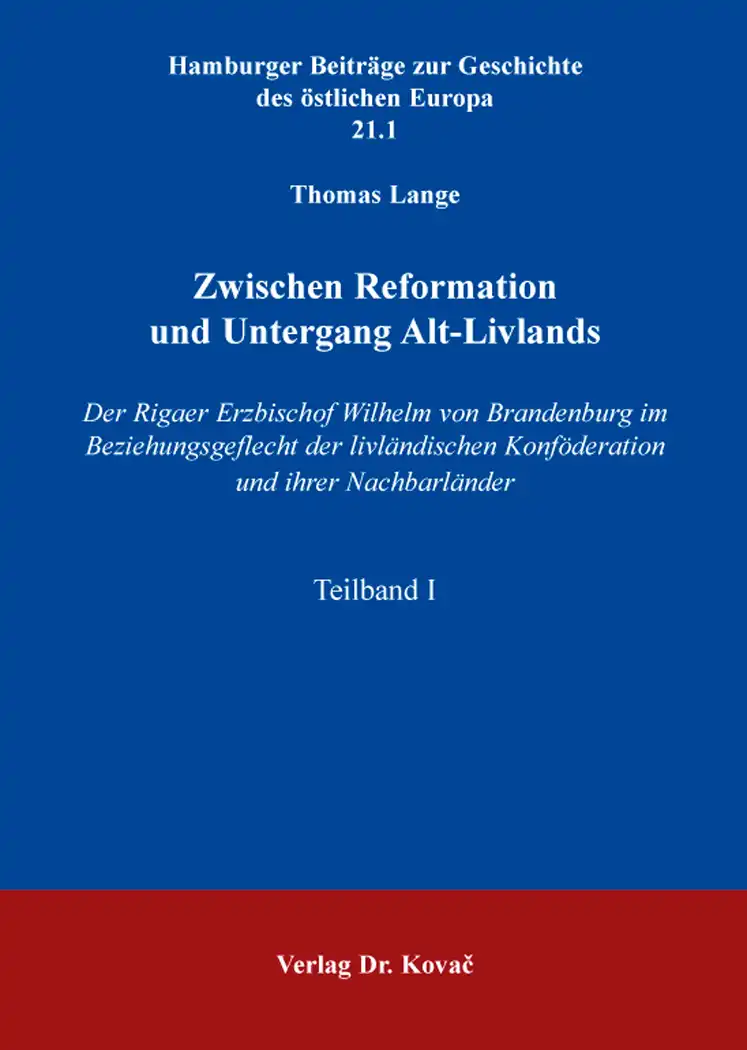Thomas LangeZwischen Reformation und Untergang Alt-Livlands
Der Rigaer Erzbischof Wilhelm von Brandenburg im Beziehungsgeflecht der livländischen Konföderation und ihrer Nachbarländer
Ausgabe in zwei Teilbänden
Hamburger Beiträge zur Geschichte des östlichen Europa, volume 21
Hamburg 2014, 796 pages
ISBN 978-3-8300-7630-8 (print)
ISBN 978-3-339-07630-4 (eBook)
Rezensionen
[…] als moderne biografische Ausarbeitung […] für alle diejenigen empfehlenswert, die sich mit livländischer und / oder diplomatischer Geschichte des 16. Jahrhunderts auseinandersetzen möchten.
[…] Die Liste der von Lange benutzten Literatur ist beeindruckend, hier findet man auch Publikationen, die an recht versteckten Orten erschienen sind, aber doch über das Thema einiges zu sagen haben. […] Das von Lange gezeichnete Bild Wilhelms ist sympathisch, aber ehrlich; man fühlt den Respekt des Autors gegenüber seinen Protagonisten. […] deutet aber gleichzeitig zweifellos auf die Tatsache hin, dass auch die anderen Akteure der letzten Jahrzehnte des mittelalterlichen Livlands eine umfangreiche Neubewertung verdient haben. Genau eine solche hat Lange für Wilhelm geliefert.
[…] Die Studie besticht durch die Tatsache, dass Ereignisse beleuchtet werden, die in der traditionell ordenslastigen Historiografie bislang keine Aufmerksamkeit erhielten. Außerdem provoziert Lange neue Diskussionen, indem er weitere Interpretationsmöglichkeiten überzeugend darstellt. Somit erweitert das Buch das Bild der letzten Dekaden des mittelalterlichen Livlands. […]
About this book deutschenglish
The confederation of independent clerical territories on the shores of the Baltic Sea, known as Livonia in the Middle Ages and Early Modern Times, was dominated by the two most powerful forces in the country: the Order of the Teutonic knights and the archbishops of Riga. During the 1520's the reformation spread rather quickly in Livonia, thereby eroding the clerical foundations of the territories. The study focuses on the life and times of the last Archbishop of Riga, Wilhelm of Brandenburg (1498-1563), born to the influential House of Hohenzollern. His biography is contextualised in the territorial entity of the archbishopric Riga, Livonia and the entire baltic area. In the context of relations between the Holy Roman Empire, Denmark, Sweden, Poland, Lithuania and the Tsardom of Muscovy, the reformatory-political entanglement of the driving forces and the limitations of their actions can be researched using the vast historical sources of the livonian late period. Questions like the contribution of Wilhelm's policy to the downfall of medieval Livonia, whether he was merely a marionette in the hands of his brother, the Duke of Prussia and former Grand Master of the Teutonic Knights, Albrecht of Brandenburg, or the King of Poland and Grand Duke of Lithuania, Sigismund II. August or if Wilhelm's main goal was the secularization of the archbishopric, are treated extensively in this monographic work. After the introduction to the governmental structures of the archbishopric Riga and its relationship especially to the Order of the Teutonic Knights, the study follows the youth of the Hohenzollern up to his arrival in Livonia as the coadjutor of the Rigan Archbishop Schöning and emphasises on his times as the successor of him with all the struggles in the confederation up to the outbreak of the Livonian War and the subjection of the archbishopric and the other livonian territories under foreign powers. For the first time the policy Wilhelm's of Brandenburg is researched in detail in regard to his attitude towards the other livonian landlords and the neighboring countries, towards secularization and the territorial independence of the archbishopric. The study makes clear that some of the verdicts of former historiography will have to be modified.Kontakt zum Autor
Keywords
16. JahrhundertBaltikumDeutsche GeschichteDeutscher OrdenErzbischof RigaFrühe NeuzeitGotthard KettlerHerzog Albrecht von PreußenLivländischer KriegLivlandOstmitteleuropaReformationRigaYour book at Dr. Kovač Publishing House
We publish your doctoral thesis >>
